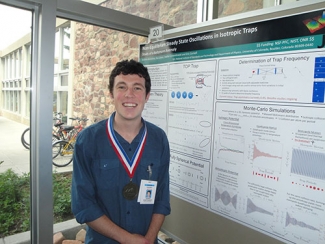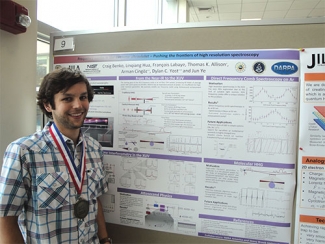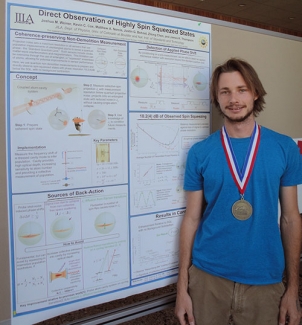Two JILA graduate students and one undergraduate student were recognized with awards for their posters and presentations at the recent Boulder Laboratories Postdoctoral Poster Symposium, held at NIST Boulder (325 Broadway) on Wednesday, June 18, 2014. The Outstanding Presentation Award is a special recognition for selected poster presenters at the Boulder Laboratories Postdoctoral Poster Symposium. This recognition was selected by senior scientists who circulated through the poster session and noted outstanding quality in both preparation of a poster and its oral presentation.
Undergraduate student Andrew Barentine was recognized with an Outstanding Presentation Award for his presentation "Non-Equilibrium Steady State Oscillations in Isotropic Traps," with co-authors Dan Lobser, Heather Lewandowski and Eric Cornell.
Graduate student Craig Benko was recognized with an Outstanding Presentation Award for his presentation " Phase Coherent Extreme Ultraviolet Radiation," with co-authors Craig Benko, Thomas K. Allison, Arman Cingöz, Linqiang Hua, François Labaye, Dylan C. Yost and Jun Ye.
Graduate student Matt Norcia was recognized with an Outstanding Presentation Award for his presentation "Reduced Back Action for Improved Spin Squeezing," with co-authors Justin Bohnet, Kevin Cox, Joshua Weiner, Zilong Chen and James K. Thompson.
Congratulations to Andrew, Craig and Matt!
The 2014 Boulder Poster Symposium, held on June 18, is the 11th in this annual conference series. This award was initiated at the 1st symposium held in 2004, which had been organized in honor of the Boulder Laboratories 50 Year Anniversary, and continues to showcase the immense contributions to research by our students at every academic level. The sponsor of this event is the Boulder Labs Diversity Council.





 The Physics Frontiers Centers (PFC) program supports university-based centers and institutes where the collective efforts of a larger group of individuals can enable transformational advances in the most promising research areas. The program is designed to foster major breakthroughs at the intellectual frontiers of physics by providing needed resources such as combinations of talents, skills, disciplines, and/or specialized infrastructure, not usually available to individual investigators or small groups, in an environment in which the collective efforts of the larger group can be shown to be seminal to promoting significant progress in the science and the education of students. PFCs also include creative, substantive activities aimed at enhancing education, broadening participation of traditionally underrepresented groups, and outreach to the scientific community and general public.
The Physics Frontiers Centers (PFC) program supports university-based centers and institutes where the collective efforts of a larger group of individuals can enable transformational advances in the most promising research areas. The program is designed to foster major breakthroughs at the intellectual frontiers of physics by providing needed resources such as combinations of talents, skills, disciplines, and/or specialized infrastructure, not usually available to individual investigators or small groups, in an environment in which the collective efforts of the larger group can be shown to be seminal to promoting significant progress in the science and the education of students. PFCs also include creative, substantive activities aimed at enhancing education, broadening participation of traditionally underrepresented groups, and outreach to the scientific community and general public.